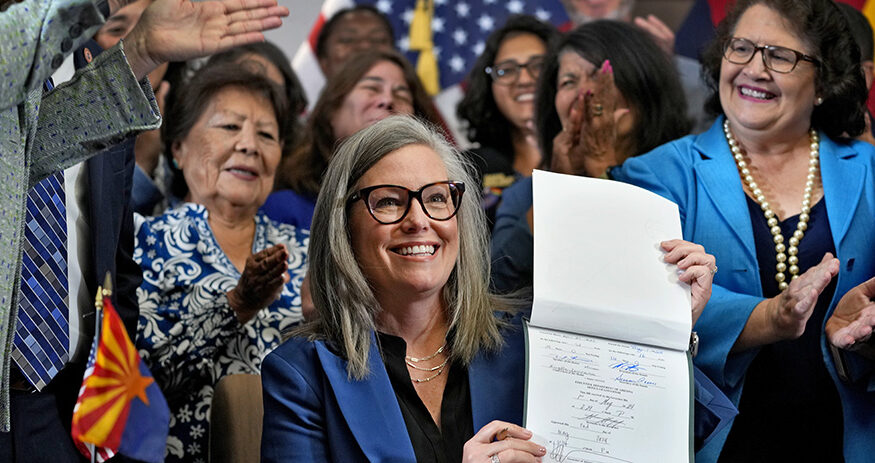A look back at 2024: Even with passage of Prop. 139 in 2024, more legal battles are expected
Kiera Riley Arizona Capitol Times//December 27, 2024//
A look back at 2024: Even with passage of Prop. 139 in 2024, more legal battles are expected
Kiera Riley Arizona Capitol Times//December 27, 2024//
Arizona’s abortion law ricocheted between the Legislature, judiciary and voters in 2024, transforming from a 15-week limit, to a near-total ban and to a right enshrined in the state Constitution.
Voters passed the Arizona Abortion Access Act, or Proposition 139, by 61.61% and provided some final say on abortion law in the process, but another round of legal battles await as Prop. 139’s provisions start to interact with the state’s existing statutory scheme.
ACLU attorney Lauren Beall said, “We live in a state where legislators have tried to block abortion access for decades. While Roe v Wade was good law, we had members of the Arizona legislature that tried to winnow down the right to an abortion as much as possible. We have a framework in Arizona of about more than 40 laws that are the result of that effort. We don’t expect those people to disappear.”
At the start of the year, the state’s abortion law was up in the air. The Arizona Supreme Court heard arguments over whether the 15-week law passed by the legislature in 2022 or an 1864 law banning near-all abortions takes precedent.
In April, the state high court handed down a ruling finding the 1864 ban to override the more recent statute passed by lawmakers as the fall of Roe v Wade rendered any implied right to an abortion written in the 15-week law void.
Weeks later, the Democrats, with two Republicans in the Senate and three Republicans in the House crossing the line, passed a repeal of the 1864 ban, leaving the 15-week limit in place.
All the while, organizers had started to gather signatures for Proposition 139, eventually eclipsing the required number and seeing a somewhat smooth road to the ballot, aside from two legal challenges.
An unsuccessful lawsuit from Arizona Right to Life sought to keep the measure off the ballot amid claimed it was misleading. Advocates for Prop. 139 filed an unsuccessful suit of their own against the Legislative Council after the promulgated summary used the term “unborn human being.”
Despite some legal hiccups, the measure went to voters and passed with 61.61%.
Following the statewide certification of the 2024 election, the ACLU, Center for Reproductive Rights and Planned Parenthood Arizona filed a lawsuit and set their sights on seeing the 15-week ban struck from the books.
Attorneys for the plaintiffs argue the 15-week law directly conflicts with the provisions set out in Prop. 139 requiring the state “shall not enact, adopt or enforce any law, regulation, policy or practice that … denies, restricts or interferes with” the fundamental right to an abortion “before fetal viability unless justified by a compelling state interest that is achieved by the least restrictive means.”
Attorney General Kris Mayes sided with the plaintiffs, leaving the 15-week law undefended for now.
Beall said beyond the 15-week ban, a host of Arizona’s abortion laws could see legal challenges in the coming year. Dr. Paul Isaacson, plaintiff in the suit, said the list is likely to include the reason ban, a law banning abortions performed solely on the basis of genetic abnormalities, the biased consent requirement, a law requiring physicians to inform patients of a long list of risks and alternatives to receiving an abortion, as well as a 24-hour waiting period.
Cathi Herrod, president of anti-abortion group Center for Arizona Policy, said she believed Prop. 139 will “overturn reasonable measures like informed consent laws and parental consent laws,” and included “vague and undefined” terms. She promised legal action.
“Moving forward, there will be lawsuits to fight, to limit the scope of 139,” Herrod said.














































